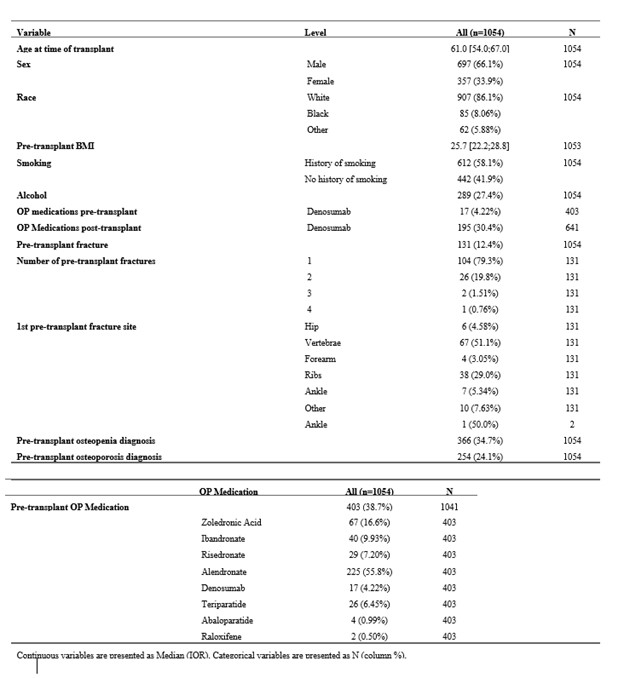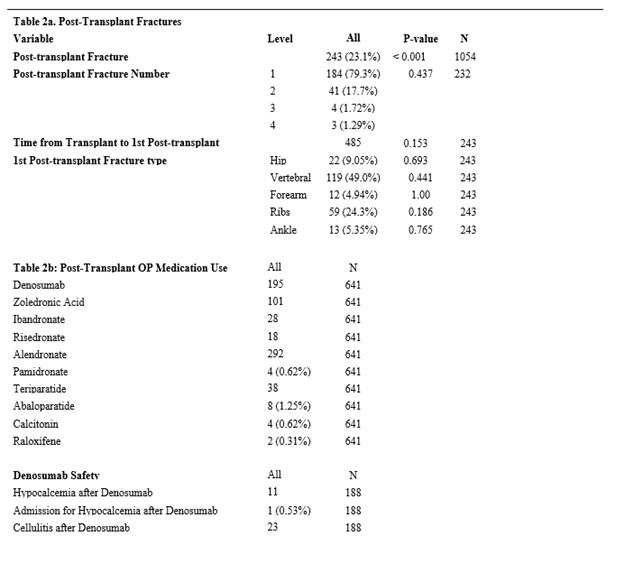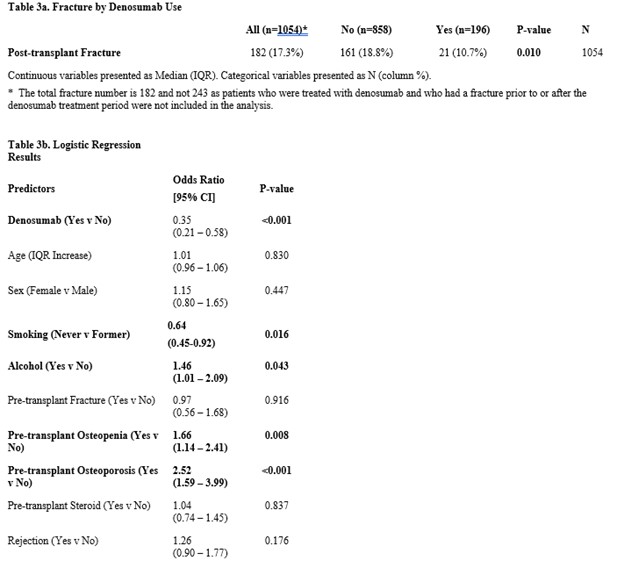Session Information
Date: Monday, November 18, 2024
Title: Osteoporosis & Metabolic Bone Disease – Basic & Clinical Science Poster
Session Type: Poster Session C
Session Time: 10:30AM-12:30PM
Background/Purpose: The incidence of fractures due to osteoporosis (OP) is increased in patients with end-stage lung disease and fractures are a well-known complication of lung transplant (LT). Few large studies have examined these fractures and the risk factors for fracture post-LT have not been well-established. Universal guidelines to prevent post-LT fracture in this population do not exist. Our first aim was to assess the incidence of OP fractures in patients pre- and post-LT and to identify candidate risk factors for post-LT fractures. Our second aim was to evaluate the efficacy and safety of denosumab use in preventing post-LT fracture.
Methods: This retrospective cohort study was conducted at a large international transplant center, and included adult patients who underwent LT between January 1, 2010, and December 30, 2020. Patients who expired within the first year post-LT or had prior LT were excluded. Endpoints included the incidence of OP fractures post-LT, and potential risk factors for post-LT fractures. Secondary endpoints included evaluating the effect of denosumab in reducing the risk of post-LT fragility fracture. Logistic regression modeling examined the relationships between denosumab and post-LT fracture.
Results: Out of 1223 patients who underwent LT, 1054 met inclusion criteria (median age 61; 66% male, 86% white, 58% had a history of smoking) (Table 1). Pre-LT, 366 patients (35%) had osteopenia, 254 patients (24%) had OP and ≥1 fracture occurred in 131 patients (12%), most commonly vertebral (67, 51%) (Table 1). Prior to LT, 403 patients were treated with OP medication (alendronate, 225 patients; zoledronic acid, 67 patients; ibandronate 40 patients, denosumab 17 patients) (Table 1). There were 243 fractures post-LT, with vertebral being the most common (119) (Table 2). After LT, 641 patients were treated with OP medication (alendronate, 292 patients; denosumab, 195 patients; zoledronic acid, 101 patients) (Table 2). In the denosumab analysis, there were 11 episodes of hypocalemia (one hospital admission). 23 patients (12%) had cellulitis after denosumab use (Table 2). In the denosumab fracture analysis, there were a total of 182 fractures, 21 in patients treated with denosumab and 161 in patients who were not treated with denosumab (fractures that occurred prior to or after the denosumab treatment period were not included) (Table 3). Denosumab use is associated with 65% (OR: 0.35, 95% CI: 0.21-0.58) decreased odds of getting post-transplant fracture after adjusting for other covariates. History of smoking, and alcohol use as well as a pre-transplant diagnosis of osteopenia and osteoporosis were all significantly associated with increased odds of having a post-transplant fracture (Table 3).
Conclusion: Pre-LT osteopenia, OP, smoking history, and alcohol use are strong predictors of post-LT fracture, highlighting the importance of OP management prior to and after LT. Denosumab is a safe and effective medication post-LT and it is associated with a 65% reduction in the odds of having a post-LT OP fracture. This is a novel finding among post-LT patients and has not been demonstrated elsewhere. These findings emphasize the importance of ongoing vigilance and the development of universal LT OP management guidelines.
To cite this abstract in AMA style:
Miranda A, Vural A, Zhang C, Varley J, Abu Alya W, Mushtaq K, Budev M, Abelson A, Deal C, Keller S. Fractures Post Lung Transplant: A Retrospective Cohort Study Conducted at an International Transplant Center [abstract]. Arthritis Rheumatol. 2024; 76 (suppl 9). https://acrabstracts.org/abstract/fractures-post-lung-transplant-a-retrospective-cohort-study-conducted-at-an-international-transplant-center/. Accessed .« Back to ACR Convergence 2024
ACR Meeting Abstracts - https://acrabstracts.org/abstract/fractures-post-lung-transplant-a-retrospective-cohort-study-conducted-at-an-international-transplant-center/



